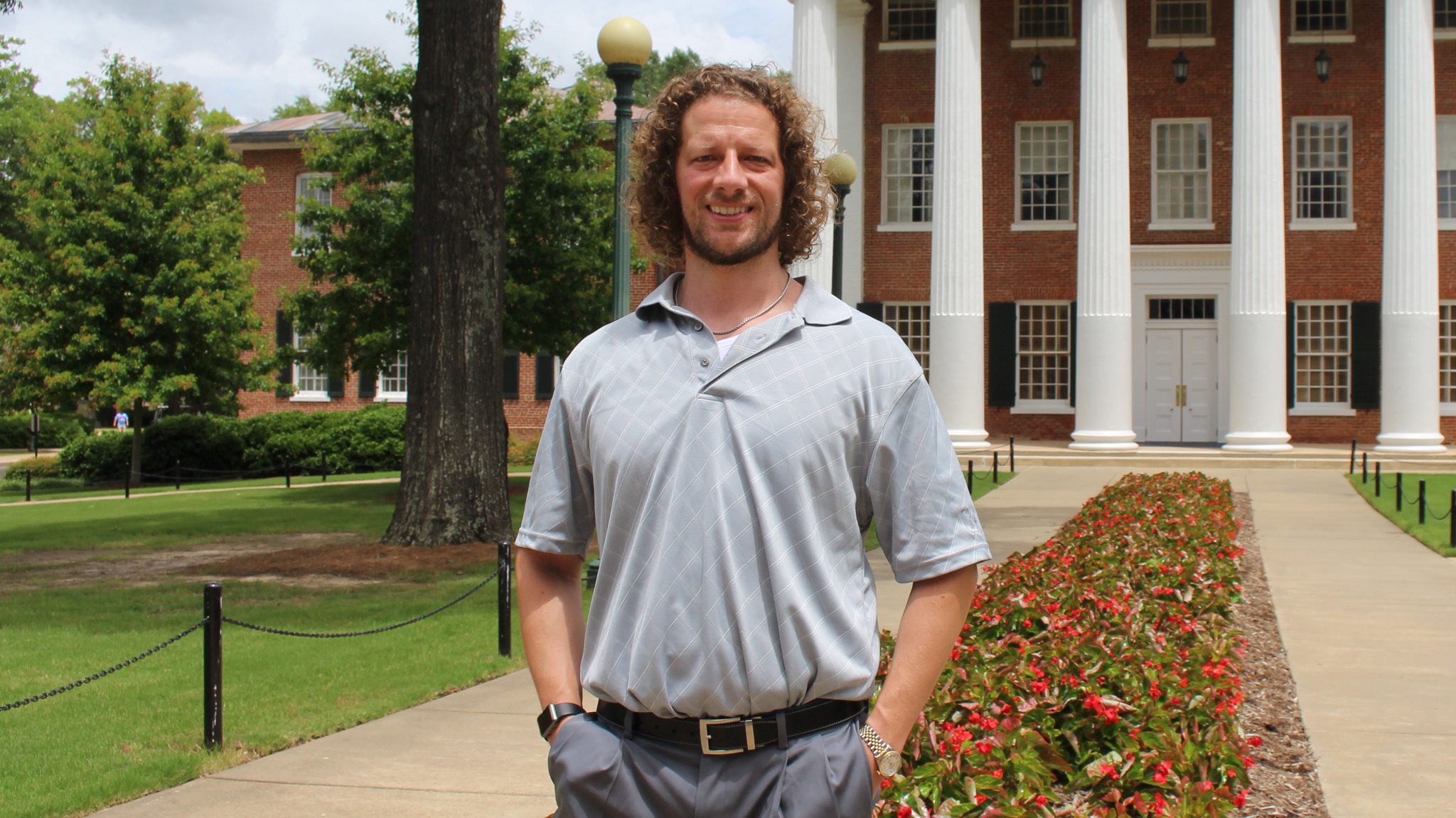
Wesley Jennings, a widely published criminologist, is the new chair of the UM Department of Legal Studies. Photo by Sarah Sapp/School of Applied Sciences
OXFORD, Miss. – Students interested in studying criminal justice at the University of Mississippi will be under new leadership this fall, and new graduates students will enjoy an evolved curriculum designed to prepare leaders for the modern landscape of criminal justice policy and practice, homeland security and emergency management..
As the School of Applied Sciences and its Department of Legal Studies welcomes Wesley Jennings, who has been recognized as the No. 1 criminologist in the world in terms of his peer-reviewed scholarly publication productivity, as department chair and professor this summer, they also will welcome two new assistant professors and roll out a revamped Master of Criminal Justice program.
“We’re upping our game in criminology and technology,” said Kimberly Kaiser, associate professor of legal studies. “We’ve improved homeland security to include emergency response management, terrorism and extremism, cybercrime and cyber security, global information systems and crime mapping, which helps us better understand crime in the community to be able to identify places to send prevention and intervention efforts.
“We’ve added more classes across the criminal justice curriculum, including seminars law enforcement, courts and sentencing and corrections.”
Joshua Shipp is a recent graduate of the program who co-directs the SWAT team for the Oxford Police Department. Even before the curriculum changes, Shipp praised the MCJ program for helping him hone important skills he uses on the force every day.
“Pursuing this degree has broadened my critical thinking skills,” Shipp said. “The curriculum required in-depth discussion and knowledge of across criminal justice topics. I have been able to take a lot of what I’ve learned in the classroom and apply it to my daily work duties.
“One of the most intriguing topics for me was the demand for emergency management personnel and their evolving role as first responders.”
A master’s degree also allows graduates to start at a higher pay grade when entering the federal system.
“I feel more equipped and credible to take on a leading role within my law enforcement agency,” Shipp said. “Being a student and full-time officer has also allowed me to bring on the job experience to students who may not already have law enforcement work experience.”

The revamped Master of Criminal Justice program at Ole Miss offers improved homeland security course offerings that include include emergency response management, terrorism and extremism, cybercrime and cyber security, global information systems and crime mapping. Photo by Getty Images
Besides expanding the curriculum to adapt to changes in the field, the department’s faculty members look forward to increasing their research productivity.
“That means more opportunity for students to engage in research,” said Linda Keena, associate professor and interim chair of the department. “We want to increase our students’ skills and knowledge in analysis and research, which will be beneficial for the current criminal justice careers that require evidence-based research-focused policy and practice.”
The department’s changes to the program focus on flexibility for students, who no longer have to choose between an emphasis in criminal justice or homeland security; they may elect to take classes in either track, Kaiser said.
The number of required classes was reduced from four to three and the number of required hours from 36 to 30, adding flexibility in terms of program completion.
“We still have a thesis option, but students can also take a capstone course where they complete in individual project or a practicum option,” Kaiser said. “We no longer require the comprehensive exam. We did this so students can demonstrate the material they learned but can also apply it.
“We also have flexibility in terms of when we offer classes to accommodate the needs of working adults. Each class is one day a week, and we offer many online classes – at least two to three a semester.”
The flexibility in curriculum and completion extends to admissions options as well.
“We still have a portfolio option for admission,” Kaiser said. “Applicants who have four years of working experience in criminal justice, military, homeland security, emergency management or other related fields would not have to submit GRE scores.
“This admissions option is designed for those who have been out of school and working, so they do have to have a letter from an employer and be working for the past four years.”
Those who are admitted to the program can look forward to new leadership and faculty expertise that will enhance the overall graduate preparation for a criminology-driven field.
With a doctorate in criminology from the University of Florida, Jennings brings expertise in quantitative methods, longitudinal analysis and developmental criminology. He has more than 250 publications and more than 7,500 citations to his published work, and serves vice president of the Southern Criminal Justice Association.
Brian Boutwell, who joins the faculty as an associate professor of legal studies, is a biosocial criminologist from Saint Louis University. With a doctorate from Florida State University, his research interests include the use of quantitative genetics to examine the environmental and genetic underpinnings of human violence and aggression and the intersection of general intelligence with various public health and behavioral outcomes.
Finally, D’Andre Walker begins his tenure as assistant professor with research and teaching interests in criminology, gender and crime, juvenile delinquency, juvenile justice, and race and crime. With a doctorate in criminology and criminal justice from Arizona State University, Walker’s most recent works explore the relationship between strains – such as victimization, deficiency in support and teenage pregnancy – and maladaptive behaviors, with a primary focus on the role of deviant peers in the coping process.
For more information about criminal justice education at UM, visit http://legalstudies.olemiss.edu/ or call 662-915-7902.
The School of Applied Sciences, home of the Department of Legal Studies, offers professional preparation programs that integrate academic study, clinical training, creative research, service-learning and community outreach, leading to the development of leaders whose professional endeavors will improve health and well-being.